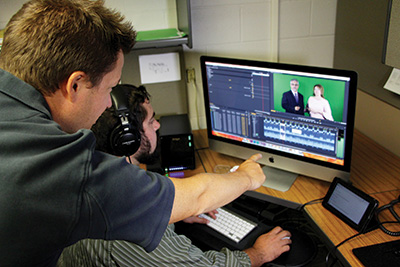
It is estimated that in the year 1900 human knowledge of the universe was doubling at a rate of about every 100 years. At the end of World War II human knowledge was doubling at a speed of roughly 25 years. In the year 2000 it was doubling in five years. Today humankind’s accumulated understanding has been estimated to double, depending on the field of study, every 12 to 24 months. The implication of the progress of human knowledge is unmistakable; we are living in the end-times.
We also live in exciting times. Communication is instantaneous and worldwide. A simple idea, any thought, a joke, or the most complex scientific breakthrough can be shared with millions of people with the push of a button or a click of a mouse. Knowledge is free and open. We can answer many of life’s questions in less than a second with a Google search. Currently anyone with an Internet connection can take a free online class from the world’s best professors at the world’s best universities. With technology anyone can learn anything, anywhere, and at any time.
The recent explosion of knowledge and technology has momentous implications for Seventh-day Adventist evangelism and education. In the twenty-first century there is an incredible—nearly unfathomable—amount of competition for our attention. The modern person has more distractions and responsibilities than our ancestors could have ever imagined. We are forced to be selective consumers because we are constantly bombarded with information.
In an environment flush with opportunities for people to choose how they spend their time, people will invest their time and energy into only high-quality, high-return activities. This means that Adventist evangelism and education must be as good as—if not better than—other demands competing for people’s limited time and resources.
Many people look at the revolution in information and technology as something to overcome, as a problem we face as a church. But this is shortsighted. Undoubtedly, technology is a massive expense for individuals and institutions, and some facets are indeed threats to our church, to our educational system, and to our souls. Nevertheless, in Matthew 24:14 Jesus said the gospel would be “preached in the whole world” before He returns. With technology we can reach more people with the gospel and Adventist values than ever before humanly possible. People now have the ability to learn about Christ anywhere and anytime. It is technology that gives us the ability today to share the gospel with the entire world.
The North American Division is currently conducting a division-wide study looking at ways to best seize the incredible opportunities created by modern Internet technology to share the gospel and Adventist values. The results from this three-month-long needs assessment will guide the design, capabilities, and offerings of the division’s 2015 launch of its Web-based initiative called the Adventist Learning Community.
The goal of the Adventist Learning Community is to provide Adventists and others with online learning opportunities that will develop their relationship with Christ and offer a communal place for Adventist lifelong learning. The kind of lifelong learning Ellen White encouraged us to seek when she wrote that education “has to do with the whole being, and with the whole period of existence possible to man.”* With the Adventist Learning Community the church can provide high-quality professional development, traditional K-university for-credit courses, and religious instruction to lifelong learners.
The Adventist Learning Community (ALC) and the publishing and consulting firm Kendall Hunt are presently researching the online experiences and prospective needs of Adventists from all demographics across the division. Hundreds of phone interviews, focus groups, and Internet surveys have been conducted, with more still to come.
Early results indicate there is a desperate need for church employees of all kinds to have access to meaningful and flexible professional-development opportunities. It is also apparent that Adventist teachers and pastors struggle with an often-overwhelming workload and have limited time to keep up-to-date on new developments and ideas in their fields. To meet this need, the ALC is building a significant number of continuing education certification programs aimed at supporting professionals with challenging schedules and who often work in relative isolation.
Additionally, the division’s Family Ministries Department is launching five online training programs that will be hosted on the ALC. The goal of these family ministries courses will be to provide learners with the information and resources they need to begin their ministry as effective family ministries coordinators.
Results from the ALC needs assessment also indicate that the church has several glaring shortcomings in regard to its online presence. Simply put, the church lacks an official online voice. For example, a few months ago I researched the words “Seventh-day Adventist” and “evolution” on the Internet. I found Web sites that depicted Seventh-day Adventists as “backward,” “schizophrenic,” and “medieval” in their beliefs about evolution and creation. Had I been someone struggling with my beliefs on evolution and found one of these spiteful Web sites, I would have been pushed further from Christ and His church. The church needs to lead online discussions on important issues such as evolution, women in the ministry, and homosexuality. The ALC can provide an official online space for the division to reach out and connect with both Adventists and non-Adventists, and thereby reduce misinformation and promote what is truly important.
When the ALC online needs assessment is complete, the division will begin construction of the ALC. Through the ALC and its technology-based approach the division will share information, promote communication, and enhance lifelong learning of all kinds. With a launch slated for early 2015, the ALC will help spread the gospel in the twenty-first century to people anywhere and anytime.
To learn more about the Adventist Learning Community, go to adventisteducation.org.
* Ellen G. White, Education (Mountain View, Calif.: Pacfic Press Pub. Assn., 1903),p. 13.